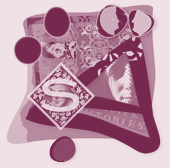
Finding humour
in a serious speech
The House of York is triumphant at this stage of the War of the Roses, and Richard the soldier is out of work. He compares, ironically, the past state of war to the present state of decadent peace. Then he draws the audience’s attention to his deformity that, he says, prohibits him from enjoying any of the “fruits” of peace. He resolves that since he “cannot prove a lover” that he will “prove a villain” and his first plot will be to destroy his brother Clarence. It is clear from the language of the soliloquy that his plan to “prove a villain” has been there all the time and the first section of the speech is simply self-justification. Richard is one of Shakespeare’s greatest villains and, like the others (Iago, for example), he has a wonderful, cruel sense of humour. This should not be neglected in the speech.
Key to the Piece: The actor must find Richard’s humour and use it to create variety and a more rounded character. Richard mocks others, but he also mocks himself.
Humour in a serious speech
 |
Play: | Richard III |
| Scene: | I, 1: 1 – 31 | |
| Character: | Richard | |
| Setting: | The city of London, outside the palace | |
| Shayne Devouges played two title roles at Dawson, including Richard III and Joseph Andrews. Upon graduating, Shayne was cast to play Luke in the Off Broadway musical, Canadian bilingual premiere The Altar Boyz/Les Enfants Choeur. Shayne is also experienced in dialects, acrobatics, dance, singing, and stage combat (rapier and hand-to-hand). | ||
Instructional Objective:
- Finding humour in a serious speech: Shakespeare’s villains (Iago, Aaron, Edgar) do this all the time and it serves the actor well to exploit the humour
Now is the winter of our discontent
Made glorious summer by this son of York:
And all the clouds that loured upon our house
In the deep bosom of the ocean buried.
Now are our brows bound with victorious wreaths,
Our bruised arms hung up for monuments,
Our stern alarums changed to merry meetings,
Our dreadful marches to delightful measures.
Grim-visaged war hath smoothed his wrinkled front,
And now, instead of mounting barbed steeds
To fright the souls of fearful adversaries,
He capers nimbly in a lady’s chamber
To the lascivious pleasing of a lute.
But I, that am not shaped for sportive tricks,
Nor made to court an amorous looking-glass:
I, that am rudely stamped, and want love’s majesty
To strut before a wanton ambling nymph:
I that am curtailed of this fair proportion,
Cheated of feature by dissembling nature,
Deformed, unfinished, sent before my time
Unto this breathing world, scarce half made up,
And that so lamely and unfashionable
That dogs bark at me as I halt by them –
Why, I, in this weak piping time of peace,
Have no delight to pass away the time,
Unless to see my shadow in the sun
And descant on mine own deformity.
And therefore, since I cannot prove a lover,
To entertain these fair well-spoken days,
I am determined to prove a villain
And hate the idle pleasures of these days.




